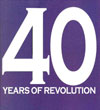News
Forty years after famous riots at Stonewall Inn, gays are still 'fighting to be seen as full humans'
By Carrie Melago - Daily News Staff Writer
Sunday, June 28, 2009

They were the riots that spawned a revolution, the nights of protest that led to the dawn of the gay rights movement.
Forty years ago this weekend, police raids to root out homosexual patrons at the Stonewall Inn caused an uprising whose reverberations are still felt today.
"The fire was lit, and it spread immediately," said John Knoebel, 61, an early member of the Gay Liberation Front, which mobilized out of the riots.
Veterans of those 1969 riots outside of Stonewall - a then Mafia-run, Christopher St. bar that allowed gays to dance and drink - are still focusing on the fights ahead of them, namely legalizing same-sex marriage.
"The parallel is gay people are still fighting to be seen as full human beings and want someone to have and to hold. And the first place we were able to have and to hold is when we danced at Stonewall," said Tommy Lanigan-Schmidt, 61.
Lanigan-Schmidt, who was 18 when he left his parents' New Jersey home with less than a dollar in his pocket, saw the Stonewall as a place where he could finally be free, a spot where he could slow-dance and socialize openly.
"You felt protected there," he said. "It became a place that I was able to be myself."
When a phalanx of police raided the place and broke down its double doors on June 28, launching days of protests outside, patrons had reached their breaking point.
"That night was a joyous night for a lot of us," said Jerry Hoose, 64, who described the atmosphere as like Carnival, but with energy and purpose.
After the nights of raucous rioting and confrontation simmered down, Stonewall faithful began leafleting and forming groups to fight for acceptance and equality.
Ellen Shumsky, 68, moved to France soon after the riots, but she returned to New York after getting letters from friends describing the activism.
"I had kind of an epiphany," said Shumsky, who had been closeted with her family and professionally. "It felt like this organization was going to heal my torn self. I came rushing back."
Veterans from the riots have seen barriers like housing and employment discrimination fall over the decades, but they see a long road for same-sex marriage, a right they never imagined being within reach.
"I'm absolutely blown away by how far we've come," Shumsky said. "I could never have conceived 40 years ago that gay marriage would be a national political concern."
Hoose has complicated feelings about the Stonewall, dismayed that the bar merely tolerated their behavior back then and frustrated by the focus on the rioting of a single week.
In his mind, the more momentous event was precisely a year later, when demonstrators marked the anniversary of the riots with the first gay pride march, openly walking from the Village to the Sheep Meadow in Central Park.
"We went on to change everything," he said.
Founders of the Gay Liberation Front will participate in a panel discussion hosted by SAGE tonight from 6 p.m. to 9 p.m. at the LGBT Community Center, 208 W. 13th St.
link: New York Daily News
